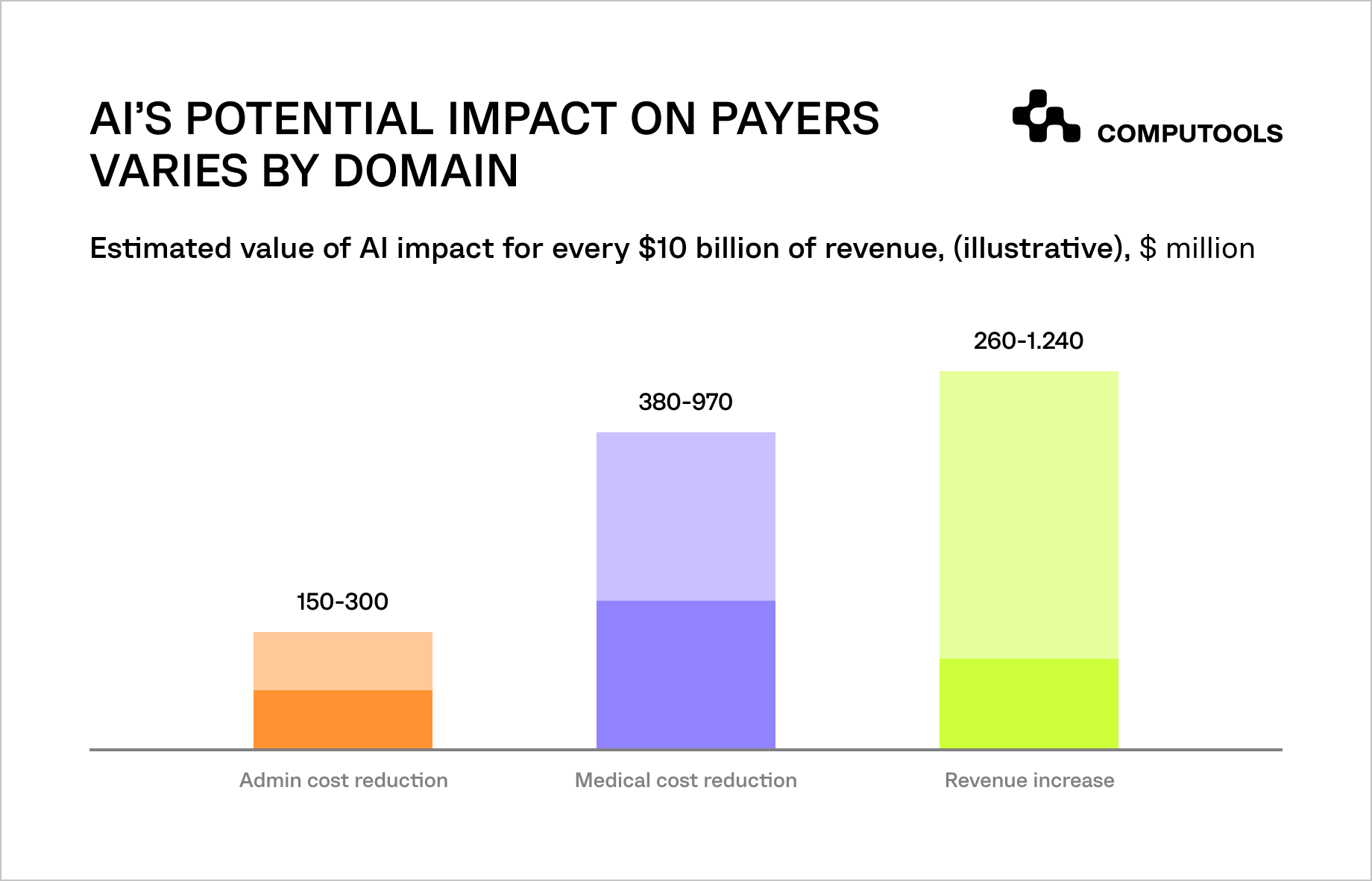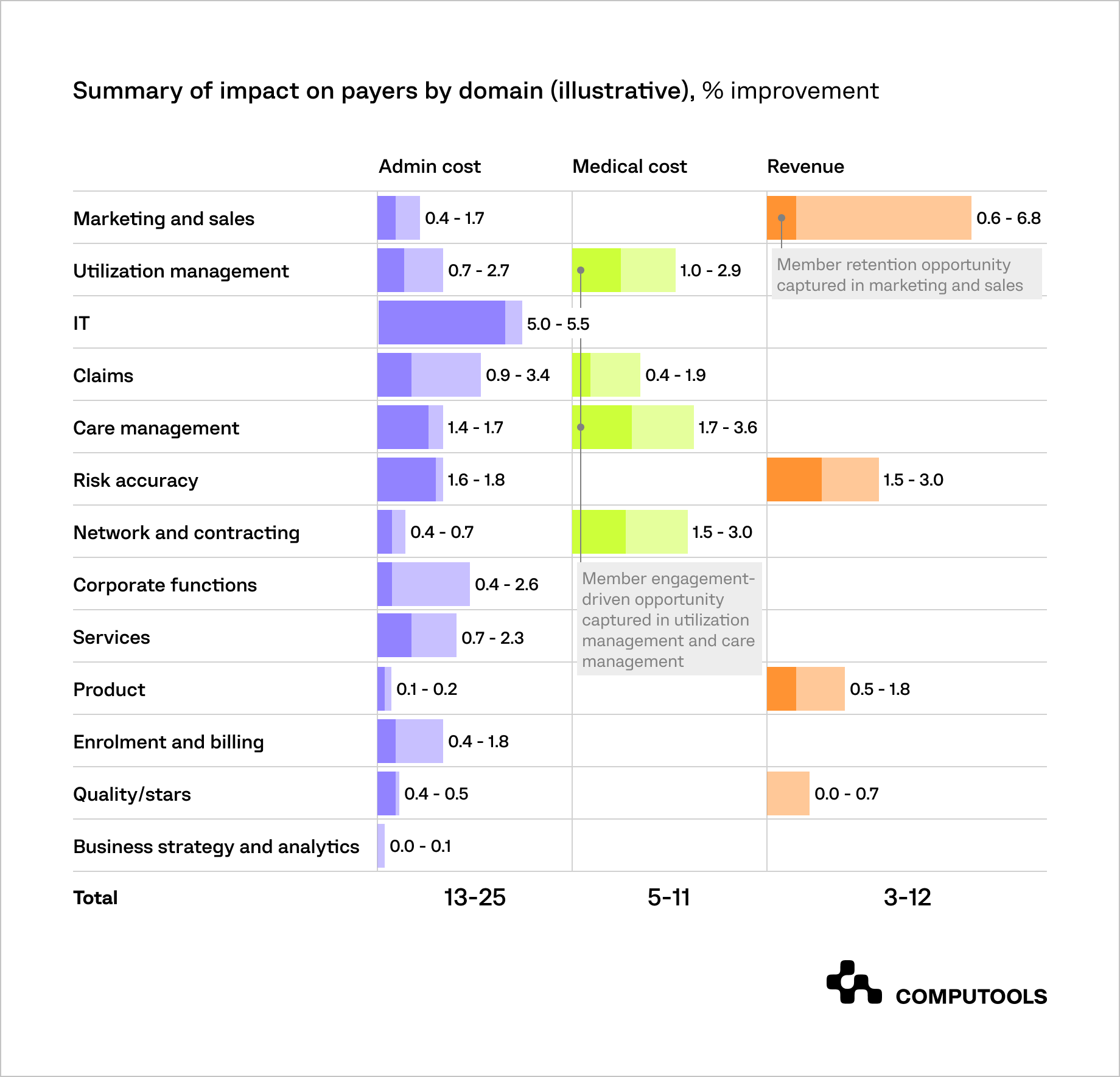In 2024, the landscape of IT solutions in healthcare industry is significantly shaped by advancements in AI, automation, and digital health solutions.
Statistical insights reveal the potential economic impacts of these technologies alongside the risks associated with their implementation.
Valuable infographics from McKinsey illustrate these dynamics in detail.
McKinsey’s research indicates that AI and automation are expected to lower administrative costs and improve operational efficiency in healthcare settings.
Specifically, the report titled “The AI opportunity: How payers can capture it now” projects that these innovations could significantly increase revenue by streamlining processes and reducing overhead expenses.

Every domain offers room for development. Claims, networks and contracts, utilization management, care management, and information technology are a few that stand out among IT solutions for healthcare industry.

People are becoming more picky about the healthcare providers, facilities, and methods they use. Other industries may teach the healthcare sector how to deliver an ideal end-to-end customer experience.
Healthcare companies cannot ignore the necessity of putting the patient at the heart of all they do as they move to the future.
They can only address customers’ expectations for holistic health and wellbeing while delivering financial returns and remaining competitive by enhancing treatment results and the patient experience. They need to stay innovative.
What Does Healthcare Innovation Mean?
Fortunately, new healthcare technology solutions are already implemented in lots of spheres.
Nevertheless, electronic medical records or online registration services are just the beginning, only a first step on the road to change.
Medicine requires not only innovative but reliable and effective solutions, and healthtech can provide them in the short term.
1. Mobile Healthcare Applications
Through the optimization of medical professionals’ storage, sharing, and interpretation of patient care data, mobile applications can assist automate some of the more laborious activities associated with their work.
The use of mobile apps in healthcare can reduce the time they spend on monitoring patients and communicating with them.
A hospital IT solution is an easy way for physicians and other care providers to access resources and work with databases that store vast amounts of relevant medical information.
They also provide an innovative solution to facilitate remote monitoring of a patient’s condition, streamline communication between the provider and patient, and increase accessibility to effective care in rural areas.
Medical mobile apps that focus on the consumer side are often more focused on the user’s daily life, helping them maintain a particular course of treatment or a healthy lifestyle.
These applications frequently carry out different computations, offer care checklists, or set reminders to help users maintain a healthy lifestyle.
Nearly 7% of customers confirmed that they’ve changed healthcare providers due to an unsatisfactory level of customer service.
On one hand, the lack of mobile integration can result in losing $100 million annually per hospital.
On the other, the development of custom-made medical apps can bring twice as much revenue.
2. Internet Of Medical Things
IT solutions in healthcare have revolutionized the way patient data is collected, managed, and analyzed, leading to better and more efficient care, and nowadays, healthcare follows us wherever we go.
Whether it’s through home A1C monitors, implanted heart devices, or phone apps, sensitive health data can be captured, tracked, and shared to assist patients in managing their care with confidence alongside their doctors.
Advanced and occasionally enjoyable IoMT devices and solutions now link individuals to healthier lifestyles in ways that we could only have imagined even just 10 years ago.
Beyond just tracking our daily steps with smartwatches, IoMT technologies are set to further connect individuals to healthier lifestyles.
Patients can now effortlessly monitor their blood pressure and share the obtained data with their doctors.
They can also easily track and share glucose readings, resulting in more reliable and convenient monitoring.
IoMT technologies can even secure real-time alerts about the early signs of strokes or cardiovascular issues.
By providing accurate self-reporting of health and activity, patients can quickly and consistently monitor and manage their own tests at home and instantly share the data, avoiding the need for expensive home care visits.
3. Online Medical Services
HealtTech software development is already transforming the industry by providing more precise and quick operational results.
Telemedicine has become a real healthcare technology that is already available to both institutions and patients.
With the help of technology, it is now possible to save time in making doctor’s appointments or waiting for tests, and to maintain medical records.
Medical care has become more accessible because of the remote format.
Location is no longer a negative factor in obsessing about quality medical care. It also saves medical professionals time by reducing the need to travel to patients’ homes unless circumstances require it. This benefits both parties.
Additionally, professionals may more effectively monitor events or processes from a distance thanks to virtual healthcare.
Patients with chronic diseases such as diabetes and hypertension, whose rehospitalizations are frequently caused by a lack of communication or openness regarding the patient’s health, have also been found to benefit from at-home patient monitoring.
Virtual reality offers yet another alternative to healthcare. Virtual and augmented reality, which is currently being utilized to treat a variety of diseases, offers substantial advancements in healthcare technology, ranging from diagnostics to medical education.
While with virtual reality, the person emerges in totally artificially created surroundings, augmented reality generates images that can be layered on top of real-world objects.
In both cases, the user can see the created imagery or text with the help of VR/AR glasses, while their hands stay free.
4. Precision Medicine
Precision medicine results from a complex interaction between individuals, their surroundings, health indicators, and social and behavioral variables.
Precision medicine examines the constituents of people and communities as well as the ways in which these components interact and evolve over time.
Healthcare software development technologies are used to create data sets that may be used to create preventive treatment programs for both people and communities.
These data sets can be used to predict therapeutic response or resistance, risk to progression (prognosis), and risk to wellness.
Precision medicine is still primarily about using large amounts of data—both in terms of the individuals involved and the data itself, which is mostly biological (genomics, transcriptomics, epigenomics, proteomics, metabolomics, and pharmacogenomics, for example) and for individual-centered applications.
In real terms, it is mostly meant for predictive medicine, which involves calculating risks based on cohorts of people sharing similar biological and clinical traits or using individual biological data to multiply diagnoses for “à la carte” health.
Providing patients with a therapy tailored to their unique biological and clinical features is the ultimate goal. Identifying which treatments or techniques will work best for a certain patient based on their biological traits and the group to which they belong is known as precision medicine.
Hence, rather than being more customized, it is more stratified medicine.
5. Management Software for Healthcare
The healthcare sector is an area in which constant supervision, thorough explanation, and careful monitoring of a patient’s condition are critical to providing effective care.
These tasks are also some of the most time-consuming parts of communication between doctors and patients.
In the near future, customers expect their providers and insurers to start interacting closely with digital solutions in healthcare.
Businesses from all other spheres have become available at one screen tap, so why can’t they receive the same kind of service from medical institutions?
Major issues faced by US healthcare organizations are hidden in fear. Hospitals fear to empower their patients with the ability to manage their health treatment process on their own.
Instead, executives find it better to stick with offline records while losing patients to other modern clinics.
The improvement of patient experience helps retain customer loyalty, raise engagement, and boost annual profits.
It is important to apply healthcare custom software development on time.
The use of already-known IT technologies and the development of new solutions based on them will bring much bigger benefits than the use of proven, but outdated, methods.
The time has come to realize the importance of transformation and change.
6. Health Insurance and Payment Changes
The healthcare business also faces obstacles related to insurance and payment.
Hospitals are being forced to move certain services to more affordable and easily accessible alternative locations of care, including virtual settings, due to clinical breakthroughs, patient preferences, and government program payment restrictions.
Patients need convenient payment methods and reassurance that they can set up a payment plan. Providers that refuse to improve their healthcare billing solutions could face disaster.
Sixty-five percent of consumers are happy to switch providers to obtain a better patient payment experience, so healthcare payment systems should be improved and transformed.
Healthcare billing solutions will inevitably move toward complete automation in 2024. The advantages are clear.
Eliminating manual processes allows staff greater freedom to interact with their patients, which in turn leads to better provider/patient relationships and improved loyalty.
Better loyalty promotes faster payments, and so the cycle continues.
Health insurance is a crucial additional healthcare option. To increase their market share and growth, a few health insurance organizations are now developing blockchain-based initiatives.
As it’s a relatively new trend, astute insurers are focusing on upholding short-term vigilance while paying particular attention to the long-term advantages.
The goal of blockchain is to implement a user-oriented, user-friendly, and voluntary method for maintaining any health information.
Insurers work with digital transformation platforms to design and develop blockchain technologies to target specific needs instead of using a one-size-fits-all approach.
Smart contracts distributed through blockchain can also be applied to healthcare insurance needs.
7. Generative AI
Healthcare executives state that while their companies are keen to employ such IT solutions in healthcare business as Generative AI to improve the way healthcare stakeholders function, some are still taking a wait-and-see stance.
Businesses are either experimenting or utilising Gen AI solutions. With regard to generational artificial intelligence, the majority of survey participants are still in the proof-of-concept phase, while investors weigh trade-offs between profits, risks, strategic goals, governance, maturity, and other aspects.
However, even with the industry’s overall enthusiasm for employing AI, a steady percentage of respondents still have no intentions to develop general artificial intelligence (gen AI) or are taking a wait-and-see stance. A tangible benefit provides compelling evidence for further and extended use and investment.
Gen AI has the potential to significantly improve patient experience and streamline processes in a number of areas.
The majority of participants believe that the area where gen AI may be most valuable is in the field of clinician and clinical productivity.
A diffusion of interest in gen AI outside of clinical settings into areas that enhance overall patient care interactions is also indicated by expectations for the technology’s potential in applications to improve administrative effectiveness and efficiency, quality of care and delivery, and patient and member engagement and experience.
Innovative digital solutions can solve the challenges facing the healthcare industry today, shaping the development of healthcare and the medical industry in 2024 and beyond.
The latest IT solutions in healthcare offered by different companies can be applied quickly.
This will give the opportunity to beat competitors, move upward in the medical services market, and lead the company to success in the next few years.
Surpass whatever challenges your digital business faces with the team of experts at info@computools.com.












Computools was selected through an RFP process. They were shortlisted and selected from between 5 other suppliers. Computools has worked thoroughly and timely to solve all security issues and launch as agreed. Their expertise is impressive.